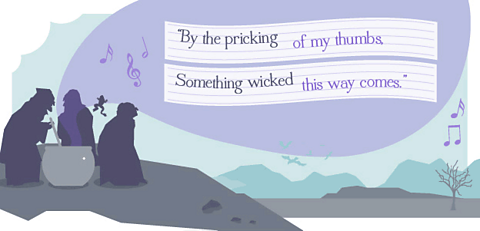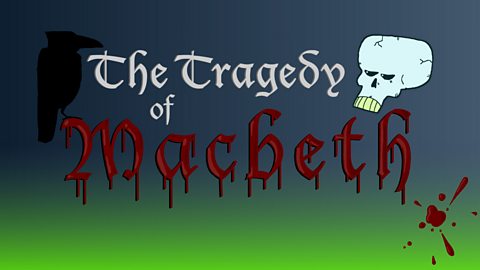Key themes
Themes are the main ideas that keep appearing in a play. The important themes in Macbeth are:
- fate
- appearance and reality
- ambition
Themes in Macbeth
Fate
Some people believe that there is a certain path that has already been set out for us, and nothing we do in life can change this. Do you believe in fate, or do you think the choices you make shape your life?
Do you think Macbeth has a choice in what happens to him or do you think the Witches make things happen with their evil magic?
Exploring fate as a theme in Shakespeare's Macbeth
VOICEOVER
Fate: whether itÔÇÖs an explanation for something big happening,or an excuse for our own success or failure,fate is a popular idea.
ItÔÇÖs the idea that our lifeÔÇÖs journeyis already mapped out ahead of us.
Its certainly popular with Macbeth.Especially when some witches tell him that its his fate
To be king!
Does Macbeth have any choice? Or is it all down to fate?
ItÔÇÖs not just the audience trying to figure this out.Macbeth is too.
HeÔÇÖs happy to accept his fate to be king,but isnÔÇÖt cheering fate on when BanquoÔÇÖs kidsget the thumbs up to be kings.
Macbeth thinks he can cheat fate.His fate cheating tactics arenÔÇÖt subtle.
None of MacbethÔÇÖs tactics are.
Violence isnÔÇÖt the only way to get to the top.What about flower arranging?
I mean, I donÔÇÖt know how fate works.
Ah. ThatÔÇÖs how.
Analysis of fate in the play
Question
How do the Witches show the theme of fate in Macbeth?
The Witches predict that Macbeth will become king. Ross arrives shortly after to announce that Macbeth has been given the title of Thane of Cawdor. The Witches may have overheard the news before, or it may just have been coincidence. As a result, however, Macbeth believes the Witches and canÔÇÖt stop thinking about being king. He does become king, just as the prophecy stated, but the Witches didnÔÇÖt tell him he had to kill King Duncan first. He chooses to do that himself.
When Macbeth meets the Witches for the first time on the heath, they say:
FIRST WITCH
All hail, Macbeth, hail to thee, Thane of Glamis.
SECOND WITCH
All hail Macbeth, hail to thee, Thane of Cawdor.
THIRD WITCH
All hail Macbeth, that shalt be king hereafter.
Act 1 Scene 3
Question
How does Shakespeare show Macbeth trying to cheat fate?
Macbeth tries to cheat fate by killing Banquo. The Witches predict that BanquoÔÇÖs children will be the future kings. Macbeth feels cheated. He has damned himself for someone elseÔÇÖs children. He wants to believe in fate when the predictions suit him, but he decides that he can cheat fate when itÔÇÖs something that he doesnÔÇÖt like! He manages to have his friend assassinated, but unfortunately for Macbeth, Fleance escapes.
Macbeth decides that he will fight fate, rather than allow BanquoÔÇÖs children to be kings:
MACBETH
Rather than so, come Fate into the list,
And champion me to thÔÇÖ utterance.
Act 3 Scene 1
Question
What is a consequence of Macbeth trying to cheat fate?
Hecate is disgusted at MacbethÔÇÖs arrogance in trying to cheat fate and sets out to cruelly destroy him.
Macbeth has meddled with black magic and as a final lesson Hecate enjoys teaching Macbeth that he canÔÇÖt cheat fate. This mirrors BanquoÔÇÖs advice in Act I Scene 3, that the Witches might hook Macbeth with initial promises then finally destroy him.
She promises to put together a spell to confuse and trick Macbeth:
HECATE
He shall spurn fate, scorn death, and bear
His hopes 'bove wisdom, grace, and fear.
And you all know, security
Is mortals' chiefest enemy. --|
Act 3 Scene 5
Question
How does Hecate use fate to trick Macbeth?
The WitchesÔÇÖ riddles make Macbeth believe that he is invincible, but in fact the Witches are talking about MacduffÔÇÖs fate. Macduff was born to destroy Macbeth. This is HecateÔÇÖs joke.
Hecate says:
HECATE
none of woman born
Shall harm Macbeth.
Act 4 Scene 1
Macbeth ignored the WitchesÔÇÖ warning to "Beware Macduff". As fate will have it, Macduff is the one man who can destroy him. Macbeth dies as he has lived: violently.
When Macbeth relates this warning to Macduff on the battlefield Macduff replies:
MACDUFF
Macduff was from his mother's womb
Untimely ripped.
Act 5 Scene 8
You can find the theme of fate in lots of ShakespeareÔÇÖs plays:
- look at Romeo and Juliet for a pair of lovers whose tragic fate is set in the stars from the very beginning
- look at Julius Caesar for men who fight knowing that their fate is certain death
Appearance and reality
Shakespeare was interested in the way that people often pretend to be something that theyÔÇÖre not, and how we sometimes fail to see situations as they really are. In this play, Macbeth and Lady Macbeth must pretend to be decent people so that they can get away with murder. Many of the Thanes must pretend to be loyal to Macbeth in order to survive. The Witches make promises which are often only half-truths. There are ghosts and visions which may or may not come from MacbethÔÇÖs imagination.
Exploring appearance and reality as a theme in Shakespeare's Macbeth
VOICEOVER
Shakespeare was fascinated in the difference betweenhow things appear and whatÔÇÖs really going on.
In this play we see Macbeth and his wife,pretend to be loyal subjects of Duncan,so that they can get away with his murder.
The Witches appear to promise Macbeth great things.
In reality, theyÔÇÖre telling him heÔÇÖs doomed.
Macbeth sees some odd things,which may just be his imagination.Imagination or not, thatÔÇÖs still scary.
For example, on his way to kill Duncan,Macbeth sees a dagger floating before him.
HeÔÇÖs not sure himself if whatÔÇÖs happening is really happening.
But for all the strange things Macbeth sees,reality catches up with him, hidden within an attackhe dismissed as silly witch talk!
What appeared to be nonsense was actually inescapable reality.Macbeth still might have the last laugh. Look.
HeÔÇÖs got a bad dose of the squirrels.ThatÔÇÖs worse than the measles.
Analysis of appearance and reality in the play
How does Shakespeare use the appearance of a dagger to demonstrate MacbethÔÇÖs mental state?
On his way to kill Duncan, Macbeth thinks he sees a dagger, but itÔÇÖs not real.
Macbeth tries to grab the dagger, but realises it is an illusion. He is not sure though, whether Hecate and her evil spirits have placed the vision there for him to point the way, or whether he is just imagining the dagger because he feels so distressed about the murder he is about to commit.
On his way to kill Duncan, Macbeth says:
MACBETH
Is this a dagger which I see before me
The handle toward my hand?
Act 2 Scene 1
Question
How does Shakespeare use the appearance of BanquoÔÇÖs ghost at the banquet to demonstrate the theme of appearance and reality?
Macbeth is terrified to see BanquoÔÇÖs ghost at the banquet, but Lady Macbeth tells him:
LADY MACBETH
When all's done
You look but on a stool.
Act 3 Scene 4
The lords at the banquet think Macbeth has gone crazy. As Lady Macbeth points out, he is shouting at a stool. Macbeth is convinced that BanquoÔÇÖs bloody ghost is sitting on the stool. Does Banquo haunt Macbeth for revenge? Or is Macbeth so distressed by the murder, his guilt makes him imagine that he can see his friend again?
Question
How do the Witches use appearance and reality to cause Macbeth confusion?
The Witches promise Macbeth that he will be safe from attack as long as Birnam Wood doesnÔÇÖt come up the hill to his castle, Dunsinane.
Macbeth feels secure because the suggestion that a wood might move is silly! ThatÔÇÖs what Hecate and the Witches want him to believe. The Messenger, when he sees the wood move, canÔÇÖt believe his eyes. In reality though, the woods arenÔÇÖt moving by themselves. The English army are using the branches and leaves as camouflage as they march up the hill to Dunsinane.
The Messenger is terrified to report:
MESSENGER
As I did stand my watch upon the hill
I looked toward Birnam and anon methought
The wood began to move.
Act 5 Scene 5
You can find the theme of appearance and reality in lots of plays by Shakespeare:
- look at A Midsummer NightÔÇÖs Dream for dreams, intrigue, tricks and spells
- look at Much Ado About Nothing for misunderstandings, masques and cover-ups
- look at Othello for the nastiest, cleverest villain who twists reality and doesnÔÇÖt get found out until the very end
Ambition
In todayÔÇÖs society, ambition is seen as a positive quality. The desire to succeed in life, to achieve fame, a better job, or power is applauded. Ambitious people work hard and turn dreams into reality.
Encouraged and helped by his wife, Macbeth killed a king to fulfil his ambitions. He continued to kill to maintain his power. His ambition destroyed him.
Exploring ambition as a theme in Shakespeare's Macbeth
VOICEOVER
ItÔÇÖs good to get ahead.
ThatÔÇÖs not what I meant.
Ambition. ThatÔÇÖs what I meant.
To want to be the best and reach the top.
WeÔÇÖre told, if we work hard, we can turn our dreams into reality.
Macbeth however, with a push from Lady Macbeth, takes the short cut to the top.
Macbeth admits heÔÇÖs ambitious.
He compares his ambition to a race-horse.
Which is interesting isnÔÇÖt it?
Because whoÔÇÖs really in charge? The jockey?
Or the horse? Does Ambition carry us away?
Lady Macbeth is worried that Macbeth is too kind to murder Duncan.
She asks spirits to take away her femininity so that she can perform the evil task.
But to stay on top, Macbeth keeps on killing
and is ultimately destroyed by his own ambition.
Did you know?
Macbeth is a tragic hero. This doesnÔÇÖt mean that he is sad! In a play, the tragic hero is a character that is noble, but has a fault in his personality ÔÇô a tragic flaw ÔÇô and this destroys him. The tragic hero always shows an aspect of his former noble self before he dies. MacbethÔÇÖs fatal flaw is ambition. Hamlet and Othello are amongst some of the other tragic heroes in ShakespeareÔÇÖs plays.
Analysis of ambition in the play
Where in the play does Shakespeare show Macbeth using ambition as an excuse for his behaviour?
Macbeth uses ambition as an excuse for wanting to kill King Duncan. His ambition is so strong he compares it to a racing horse. He knows that he will commit a terrible sin by killing a king, but he canÔÇÖt help himself - his ambition wonÔÇÖt let him rest until he has it all.
He says to himself:
MACBETH
I have no spur
To prick the sides of my intent, but only
Vaulting ambition
Act 1 Scene 7
More on Macbeth
Find out more by working through a topic
- count3 of 5

- count4 of 5

- count5 of 5

- count1 of 5
